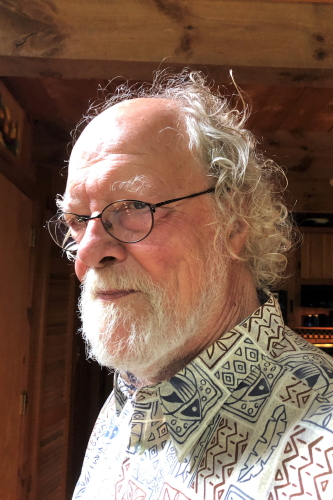
David Giannini
Good morning, everyone! As we did last month, we’re sharing some readers’ favorites for those who may have missed them the first time. David Giannini last appeared here in 2022. Since then, his latest book, Already Long Ago (Dos Madres, 2023) is already garnering high praise.
–Irene Willis
Poetry Editor
A Woman in the Asylum on the River
Even in my mother’s womb
I sensed that
I could not escape without help; that there
more meaning entered my desire
to be where I was
coming into focus
under that transducer
and mother’s delusions.
Now, a grown woman,
I am locked in again,
elsewhere, looking out:
you can’t fall out of a river
unless you’re part of the water,
you can’t fall out of the same fluid twice,
even if you’re the spirit of flow
becoming windblown drops on land,
then going deeper through soil to roots.
Trees participate in their standing—
If only I could fly into their green
air—. Indoors, here,
my future’s what’s unstable: rage, meds,
ruthless nourishment. I think filthy sponges
inside me soak up and squeeze out my fears.
The mourning dove is on the sill again—
voice, portable as despair,
I thought you were only a bird.
My captors think I will stay trapped in
this ward, at this barred window,
merely watching, watching
the dove and the river escape.
Time Circle
In Memory of Jonathan Baumbach and Annette Grant
What you had been talking about
how we all know we are
captured by the nabbing clock
the calendar inexorable
Fat chance your deaths took
you whisked by Lethe
to some pavilion of former lives
or parhelion of what you knew not
of light through high crystals
and the sea of herbs
in your garden now your ashes
with the soil the last waves
of our hands bidding rest
with the soil the last waves
in your garden now your ashes
and the sea of herbs
of light through high crystals
or parhelion of what you knew not
to some pavilion of former lives
you whisked by Lethe
Fat chance your deaths took
the calendar inexorable
captured by the nabbing clock
how we all know we are
What you had been talking about.
Thinking of Ludwig Again
As a child he started out standing atop a footstool to reach the piano keys, his punk father beating him for each hesitation or mistake, Ludwig in tears against that drunk.
Decades later, fenced in deafness, he sawed the legs off his piano, to sense the floor vibrate as he played, and later affixed a metal rod to the keyboard, to compose, fingers playing, teeth clenched on that long bar, vibrations conducting in his jaw.
Furled heads of ferns bent over the snail beside an Austrian vineyard, as his publisher hefted a gift of 12 bottles of wine to Beethoven’s deathbed, then heard the composer’s last words in response, “Pity, pity, too late!”
No one knew mercury for syphilis ate and ravaged him beyond silence. Felted wool under hammers, the scroll of his violin in shadow. Outside: fiddleheads, flowers, and the snail a single foot gliding over petals.
